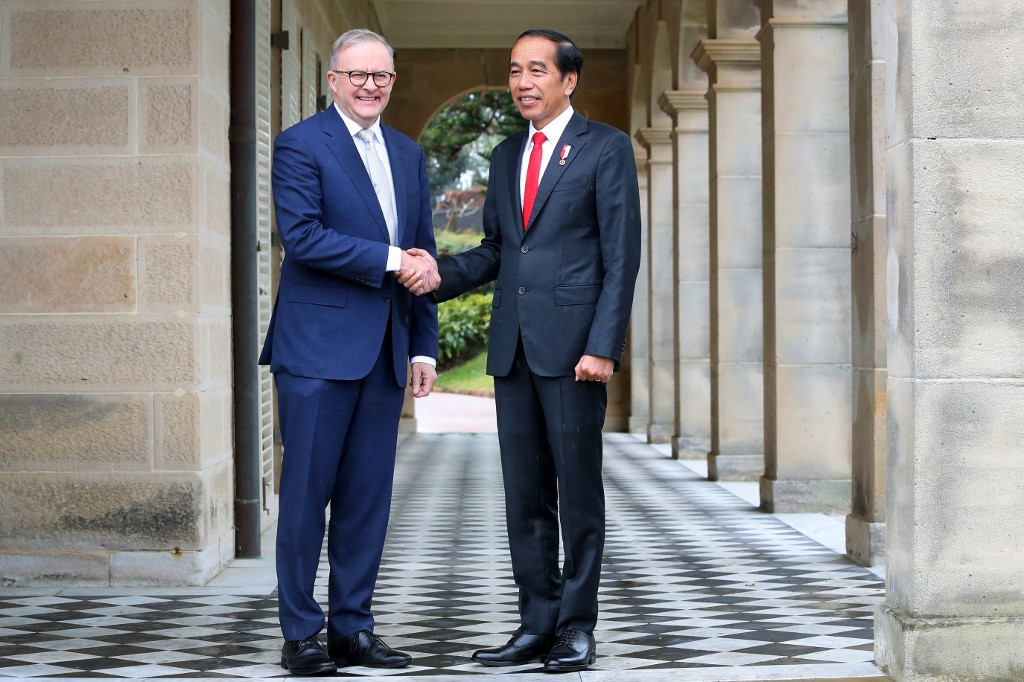Popular Reads
Top Results
Can't find what you're looking for?
View all search resultsPopular Reads
Top Results
Can't find what you're looking for?
View all search resultsPartnership in critical minerals
Indonesia’s huge nickel resources and Australia’s lithium resources should become the bridge for a commercially viable and symbiotic partnership for the two neighboring countries to develop battery and electric vehicle (EV) industries.
Change text size
Gift Premium Articles
to Anyone
T
he agreement on the 2023-2025 Action Plan between the State Government of Western Australia and the Indonesian Chamber of Commerce and Industry (Kadin) on the development and processing of critical minerals, notably nickel and lithium, is quite strategic. The agreement will trigger the acceleration of economic and trade relationships between the two countries which have so far been much narrower than their real potential. The cooperation also will strengthen the two countries’ commitment to speed up their transitions to renewable energy.
As the signing of the Action Plan was made on Tuesday in Sydney on the sidelines of the summit meeting between President Joko "Jokowi" Widodo and Australian Prime Minister Anthony Albanese we are confident that the strong political support will speed up the realization of the cooperation agreement. The participation of business leaders from both countries in the deal right from the outset will also ensure that Indonesian and Australian investors will buy into the integrated development of the critical minerals.
The completion of the Action Plan, which contains so many technical details, was remarkably fast given that the agreement was based on the memorandum of understanding between the Western Australia government and Kadin signed in Perth early this year during the visit by Coordinating Minister of Maritime and Investment Affairs Luhut Pandjaitan. Luhut also met with the management of Australian lithium miners such as Tianqi Lithium, BHP and Pilbara Minerals.
The partnership will open up opportunities in the critical minerals sector. Indonesia’s huge nickel resources and Australia’s lithium resources should become the bridge for a commercially viable and symbiotic partnership for the two neighboring countries to develop battery and electric vehicle (EV) industries.
Indonesia is well-endowed with nickel, accounting for 37 percent of global nickel production and 22 percent of international reserves, but lacks lithium. Furthermore, Indonesia has a large low-cost labor force to man the industry. The country is naturally very ambitious to become a regional battery production hub and eventually a center for the EV industry but it needs lithium, a critical component for the car battery industry, from Western Australia, which holds the second-largest lithium reserves in the world and is the largest producer globally.
Companies from South Korea, China and Japan have begun investing in the nickel, car battery and EV industries in Indonesia but these investors need to ensure a consistent and secure lithium supply. Analysts say an average EV battery requires around 8 kilograms of lithium. This should be a strong driver for joint ventures between Australian and Indonesian businesses.
We know there are many big Indonesian business groups already operating through their subsidiaries in the Australian natural resource sector, mainly in metallurgical and thermal coal mining. Since coal use is now being gradually phased out in the transition to renewable energy, these companies should be aggressive in investing in Australia’s lithium industry. Companies operating in the manufacture of car batteries and EVs in Indonesia will be the major users of Australian lithium. They should therefore enter the supply chain at the mine level in Australia to secure supply.
Australia is globally known as a major source of energy and minerals. Indonesian firms can play a crucial role in accelerating supply by providing financing for mining and processing before manufacturing at home. So strategic is the role of the linkage of the nickel and lithium industries both in terms of economic benefits and contribution to mitigating climate change that both governments also should provide incentives for cooperation in the lithium value chain.
Joint ventures in the lithium industry would broaden and intensify business relationships as companies of both countries will increasingly be engaged and get more exposed to the prospects of investments in other business areas. Put it briefly, the partnership in the critical minerals will trigger a faster expansion of their economic ties, which have so far been growing much slower than their potential even after the implementation of the Indonesia-Australia Comprehensive Economic Partnership Agreement (IA-CEPA) in 2020.











